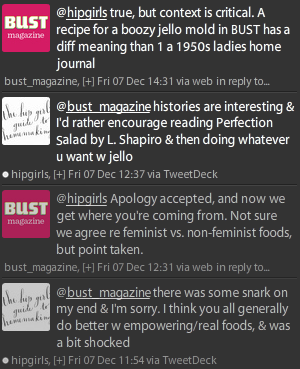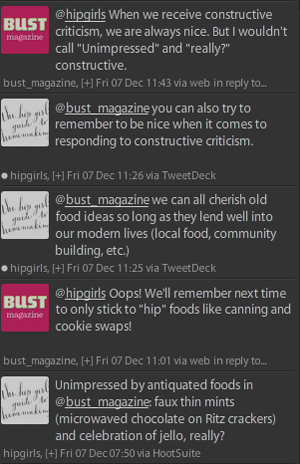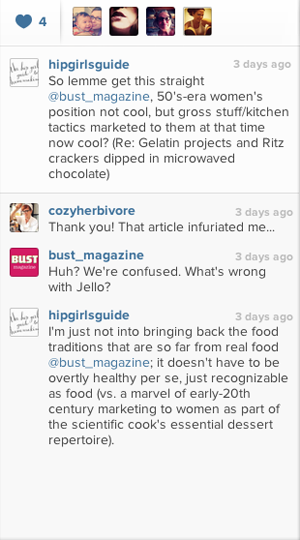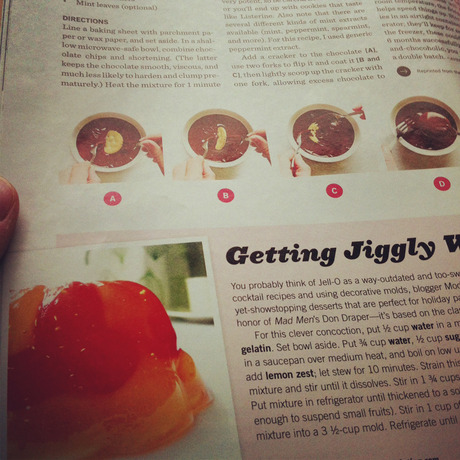Food trends: Gelatin molds and Ritz Crackers?
March 2013 UPDATE: No apology and BUST removed the blog post wherein they reviewed my book on May 19, 2011. Rad way to deal with criticism, perceived constructive or not.
I had a disturbing conversation with BUST Magazine on Friday, which is featured below in its entirety.
It was spurred by my shock to find the only two food projects in the Dec/Jan 2013 issue so entwined with Big Food and general thoughtlessness surrounding women.
Let’s start with the faux/vegan thin mints. Ritz crackers are gross, not to mention GMO-laden. Read the label yourself:
Ingredients: ENRICHED FLOUR (WHEAT FLOUR, NIACIN, REDUCED IRON, THIAMINE MONONITRATE [VITAMIN B1], RIBOFLAVIN [VITAMIN B2], FOLIC ACID), SOYBEAN OIL, SUGAR, PARTIALLY HYDROGENATED COTTONSEED OIL, SALT, LEAVENING (BAKING SODA AND/OR CALCIUM PHOSPHATE), SOY LECITHIN (EMULSIFIER), NATURAL FLAVOR, CORNSTARCH.
And, one other lesser issue, the recipe tells you to microwave the chocolate and other ingredients. I think we’re a smarter society of kitchen inhabitants and can be told to melt chocolate however you deem appropriate. In a saucepan over low heat or, fine, do it in the microwave. Defaulting to the microwave is terribly non-real-food and reminiscent of family members who prefer to do the bulk of their cooking in the microwave. No thanks.
Now, I’ll move to the boozy gelatin mold. Gelatin molds, colorful jiggly, random-things-suspended-in-them are not something from old food traditions that I feel need to be brought back. I’m not trying to be a jell-o (or gelatin) hater, but glorifying something that’s so disconnected to food and ingredients (or even cocktails and the ways to make them fresh and vibrant with real ingredients). A gelatin mold vs. say, canning, has no political or agricultural movement behind it. Booze or no booze, it has 1950’s written all over it, now and in the past.
Fitting with my general M.O. on reviving traditional domestic arts, I say do whatever you want with jell-o or gelatin if it makes you happy, but it’s not an appropriate thing for a feminist trend-setting mag to be glorifying. It offended my sensibilities and made me wonder what made them think that was okay. (If you want to make gelatin molds because it’s something your family did or you find it fun, then by all means please do. I’m not telling you it’s wrong to personally enjoy it. No movement, either the real food or the feminist movement, has a right to personally judge anyone.) I’m speaking about the larger context surrounding women and jell-o molds in the past.
I’m by no means an expert on the feminist movement from the 60’s to today, but my personal attachment to feminism means we have choices first and foremost and should be thoughtful about the things we buy, consume, and support and I don’t think there’s anything worthwhile in the gelatin mold.
Read our conversation from the bottom up:


and our exchange on instagram

True, I could have used my 140 characters more diplomatically in my initial tweet (and thought I got more about what I meant into the instagram), but what I said didn’t warrant such a dismissive and rude response, especially if they weren’t 100% sure where I was coming from.
I think it’s not okay for a trend-setter and promoter of feminist culture to feature those two food projects and it’s doubly not okay for them to respond to women who speak up with such biting remarks and unapologetic sentiments. Notice how I said sorry for the initial snark, and heard nothing from them re: their prickly attack on my blog/food practice.
Their final tweet about the gelatin mold context is just untrue. Yes, the era is different but the context is the exact same. It’s an old food practice/project that’s tied to marketing to women, fake foods and faux cooking and was just as boozy in the 50’s as this feature presents now.
My subscription ended with this recent issue and I don’t think I’ll be re-upping, nor considering BUST any longer as a gift for women who value food as part of the feminist movement.
